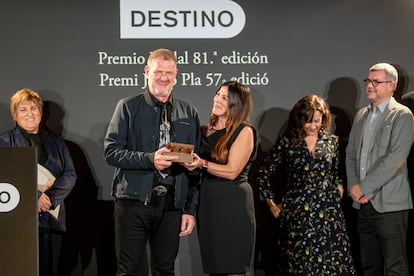For many in the publishing sector, the Christmas celebrations end on Twelfth Night at the Palace hotel in Barcelona, where prizes are awarded for unpublished works by the publishing house Destino (Planeta). The writer and journalist Jorge Fernández Díaz (Buenos Aires, 64 years old) has been the winner of the Nadal Novel Prize with Martial’s secretwhere he tries to decipher the relationship with an opaque father, while the popularizer and biologist David Bueno (Barcelona, 60 years old) has won the Josep Pla Prize for prose in the Catalan language with the essay The art of serving humanswhich connects science and humanism. Both will hit bookstores on February 5. The gala was also dedicated to the commemoration of the centenary of the birth of Ana María Matute (Barcelona 1925-2014), winner of the 1959 Nadal and a fundamental name in the history of the publishing house.
A total of 769 works from all over the world have been submitted this year for the 81st Nadal Prize, worth 30,000 euros. As noted last year, the proposals are varied but the preference for crime novels and the thrillerwith special attention to stories with a feminist, fantasy or connection with nature background. A jury made up of Inés Martín Rodrigo, Care Santos, Lorenzo Silva, Andrés Trapiello and Emili Rosales has chosen the novel Martial’s secret presented under a pseudonym and with the title Martial. In this autobiographical novel, Jorge Fernández Díaz continues the line of Mother (Alfaguara, 2019), where he mixed journalistic chronicle and biography to tell the story of his mother, like his father, who arrived in Argentina from Asturias to flee the misery of the civil war.
“There my father was a chapter, a secondary character; It was also in our lives. He was a hermetic person who enveloped himself in himself. There is only one mother but every father is an enigma; I decided to solve it.” In Martial’s secret, The writer investigates through fiction the story of his father, Marcial Fernández, also a migrant and Asturian: “In Argentina, my parents built an immigrant epic in a Spanish community; I dedicate the novel to that community where I was raised.” Jorge Fernández Díaz has already written in his previous books and articles about a thorny relationship: like other parents of his generation, Marcial never wanted his son to dedicate himself to the world of literature, and the son fought and reconciled with the disapproving gaze of the father. With touches of suspense, halfway between Asturias and Buenos Aires, the novel spans from the second half of the 20th century to the present: “He died in 2005 and since then his literary ghost has haunted me (…) now he returns to Spain in form of a novel.
Jorge Fernández Díaz began writing when he was young in a newspaper in Patagonia, in The reason and in the weekly News. Currently, he is a recognized political analyst in The Nationand considered one of the chroniclers of current Argentina. In addition to the success Motheris the author of novels, chronicles and books of stories. Among his recent works, the police saga starring agent Remil stands out: The dagger (2015), The wound (2018) y The betrayal (2021), all published in Destino.
A total of 40 varied titles have been submitted for the Josep Pla award, which celebrates its 57th edition and includes works of any genre in prose. The prize is 10,000 euros and the jury is made up of Laia Aguilar, Montse Barderi, Jaume Clotet, Manuel Forcano and Glòria Gasch. David Bueno (Barcelona, 1965), neuroscientist and one of the best-known names in scientific dissemination, presented the essay under a pseudonym. When the human being wakes upfinally titled The art of serving humans. With the intention of bringing his knowledge closer to the common public, in this essay he connects science and humanism with the goal that the reader discovers “the homo artisticus that we all have inside.” Bueno thanked him for the award, promising that “it is not a culmination, it is an impetus to continue the line of my work: how neuroscience can help improve the educational system.” With hopeful slogans and quoting Byung-Chul Han, he has highlighted the importance of “the arts in plural”, including science and philosophy.
David Bueno is a doctor in biology and research professor in the Evolutionary and Developmental Biomedical Genetics section of the University of Barcelona. Since 2019 he has directed the UB-EDU1st Neuroeducation Chair, the first in the world dedicated exclusively to this field. In addition to specialized books, he has published a long list of popular science titles and often collaborates with general media. Among his most recent works, Educate your brain (Rose of the Winds, 2024) o The adolescent brain (Rose of the Winds, 2022).
Takeoff of the centenary of Ana María Matute
At the ceremony, which was attended by authorities and writers (including the winners of the last edition, César Pérez Gellida and Jaume Clotet), Ana María Matute and her relationship with the publisher were honored: “Fairy godmother of award,” according to Núria Soler, host of the event, who has also announced that Destino will dedicate the commemorative year to republishing Matute’s works.
The Barcelona writer won the Nadal Prize in 1959 with First memorywas one of the 232 originals submitted. The anecdote of the first time that Matute appeared at the age of 19 at the publishing house with a black-covered notebook that was the manuscript of his first novel, was then recalled. small theater. The director was Ignacio Agustí and he recommended that he type the novel. It was 1954 and the title ended up winning the Planeta Prize. Inés Martín Rodrigo, 2022 Nadal Prize winner, has recognized herself as part of an “overwhelming literary lineage” and has recalled the author’s literary universe: “A world full of adults where childhood never ends.”

